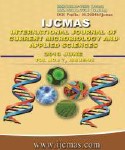


 National Academy of Agricultural Sciences (NAAS)
National Academy of Agricultural Sciences (NAAS)

|
PRINT ISSN : 2319-7692
Online ISSN : 2319-7706 Issues : 12 per year Publisher : Excellent Publishers Email : editorijcmas@gmail.com / submit@ijcmas.com Editor-in-chief: Dr.M.Prakash Index Copernicus ICV 2018: 95.39 NAAS RATING 2020: 5.38 |
Field experiment was conducted to study the effect of microbial consortium consisting of biofertilizers viz. nitrogen fixers, P solubilizer, K releasing bacteria and nutrients mobilizers were used. A pot culture experiment was conducted during the year 2016-17 at Agriculture Research Station, Amaravathi. There were two microbial consortia (MC1 and MC2) consisting of nitrogen fixers Azospirillum and Azotobacter were applied alone and with recommended dose of FYM to the soil treated with different doses of chemical fertilizers. Plant growth characteristics viz; plant height, number of leaves per plant, shoot and root dry biomass and nutrient (N, P, K) uptake were found to be maximum in the treatment T11 (MC1+75%RDF+FYM). Inoculated and un-inoculated plants were colonized by AM fungi. Inoculated plants were significantly colonized compared to application of 100 percent RDF alone. Results also showed that bio-fertilizer tended to reduce the application rates of chemical fertilizers. Microbial consortia (Azospirillum) MC1 along with recommended dose of FYM and 75 per cent recommended dose of chemical fertilizers could be recommended for pearl millet production in the study area.
 |
 |
 |
 |
 |